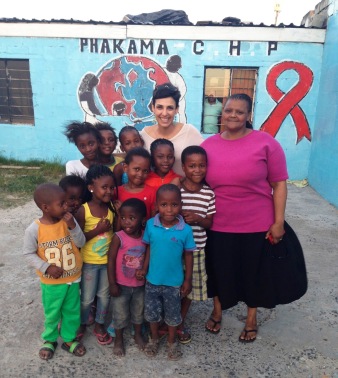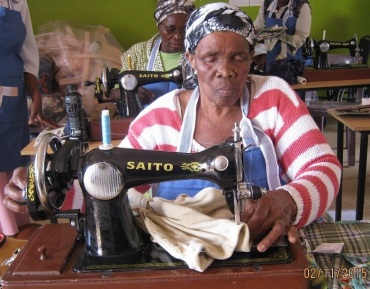TruImage – Veronique and Bernadine
“When you educate a woman, you change a nation” – Malcolm X
TruImage co-founder, Veronique Ellers-Zoutman, and youth volunteer, Bernadine Botha, inspire goosebumps with their vision, their selflessness and their bounteous energy.
Founded during 2008, and registered as an NGO during 2010, TruImage creates a space for young women to develop socially, personally and spiritually, so that they can render service to their immediate environment and community. They do this through structured training, continuous evaluation as well as strategic and compassionate community interventions. TruImage teaches young women that they are created perfectly, that they should love themselves as perfect and embrace their true image of perfection. This is the underlying message of all their work, from combating gender-based violence to providing empowerment and general support. “It starts with self-love, without which others cannot love you”, asserts Veronique.
They work in the economically marginalised areas of the northern suburbs of Cape Town, including the informal settlement of Green Park, farms around Eerste River, Klein Jacobsdal, Firgrove and Macassar, as well as deprived communities in Belhar, Delft and Kalkfontein.
Veronique, born in 1981, is a trained accountant whose church sent her to do volunteer work for several months in a refugee camp in Belgium, after which she felt “a calling” to do community work, and promptly resigned her day job as a bookkeeper in a private company. While doing volunteer community work she met WHEAT, who supported her with registering TruImage, and also sponsored her to complete a professional course in NPO Management at Stellenbosch University’s Business School. Veronique is married to a financial manager who takes care of their domestic expenses, to free her to engage with her community work without the usual stresses of sustained personal income. They have two young boys and foster a baby girl. As Veronique says, “they’re all community children. I have a very supportive husband. I couldn’t do what I do without him. It’s important to have support systems in place to successfully do this sort of selfless community work. It’s not a paying job, it’s not about bringing money into the household, but it’s the most rewarding job one could have.”
Bernadine Botha, born 1987, started volunteering with Veronique when she was in high school. The first words Veronique said to her were, “you are warming my place”, which showed that Veronique was deeply committed to building capacity and aware that all leadership positions are only temporary, to be filled by generations as they grow and mature. Bernadine honours Veronique’s mentoring: “She inspired me to have dreams, to look forward to things. I fell in love with TruImage, the heart of the volunteer. Hearing TruImage’s story gives me gooseflesh each time even if I’ve heard the story a hundred times.”
TruImage offers empowerment workshops with young girls, aged 14 to 18 years. They focus on combating gender-based violence, offer support groups for young girls struggling with teenage pregnancy, and facilitate quarterly lifeskills camps. WHEAT funds their work in general, especially their empowerment work and training workshops on gender-based violence.
As the only registered organisation working in Green Park, TruImage is tasked with fulfilling most of the community’s needs. For Veronique, Green Park is “a very multicultural community, a little village. They even have a Khoe chief with uncles and aunties serving on committees for the benefit of the community”. Over the past two years TruImage took over the defunct Educare Centre, where community women, “aunties”, care for the children of teenage girls. This enables the young girls to return to school. Since TruImage at times embody ‘tough love’, the inspire the girls to attain a minimum 60% pass rate in order to maintain their childcare fees at R50 per month. Teens even do their homework in the centre. Five “aunties” – the principle and four teachers – completed certified Early Childhood development training at a local college, and manage the crèche. “It’s a community-run educare centre,” asserts Veronique.
They also manage a feeding scheme or soup kitchen on Tuesdays, which feeds between 60 and 100 children. In their skills development container, community women do sewing, beading and crochet, and teach young girls who are not at school. They create a platform where “gogos” or “aunties” can talk with community girls and teach different skills, a space for conversation and support.
In other areas they facilitate regular short workshops with a range of topics, including gender-based violence, teenage pregnancy, as well as counselling on HIV&AIDS. With their quarterly camps we bring all the neighbourhoods together so the girls can see that there is more that binds them than what separate them. As Veronique puts it, “it’s not about where you come from, but what connects.”
They go into communities that are very disadvantaged and have high crime rates. As they put it,“We do a needs assessment with the community, going door to door. We link especially with lifeskills teachers at schools the neighbourhoods. We custom make interventions for specific areas.” Delft and Belhar suffer high crime rates, compounded by tik and other drug-related crimes. On the farms they see more teen pregnancy and school dropouts, as well as numerous child-headed households. In the Green Park informal settlement there is no electricity, which is very challenging for the community regarding high crime, and for TruImage since they have to prepare everything like printing in advance of workshops, even as they are fundraising for a generator to improve their interventions. They are also starting community gardens, since most of the residents are unemployed and can live off the produce. They deal with extremely high levels of gender-based violence, especially rape and domestic violence, exacerbated by poverty, unemployment and substance abuse.
They speak of their communities as “gebroke, broken, broken by poverty. There is a great need for intervention in our communities, not just from government and politicians, but interventions from within. There’s a need for communities to care for each other, not just financially. But a real care – who is my neighbour, what is happening. If a husband lifts his hand to his wife I would phone the police. Communities should heal themselves through these types of interventions.”
With their camps for girls they realised that girls return to abusive relationships and continue to place themselves in danger, including with “sugar daddies”, having unsafe sex, and teenage pregnancies. So they started two trial camps last year with about thirty boys from different communities. Veronique says they “can’t just work with women only, but need to transform boys as well.”
They also work with mothers to educate their sons on how to treat women, how to speak with women. As they put it, “our mothers are our greatest educators. If we can improve the mother-son relationship, it would have a bigger impact, to start from a young age.” They run boys-only camps that they would like to have each quarter, as they do with girls. Although they are increasingly including boys in their strategic work, they are firm about the fact that their “primary focus remains girl and women empowerment.”
To enhance their work with young girls and boys, TruImage would like to establish a dedicated youth centre. As they put it, “we want to create a home for young girls where they can be educated on different levels and be of service in their communities, and give back, pay forward. We want them to know they can come to TruImage for that home, that haven. While we can’t see to all their needs, we can refer them to other service providers for help. We want them to know they’re not alone in this fight.”
TruImage won the Wheat Success Award at Artscape’s annual Women’s Festival during 2011.








